Searching for Sugar Man (2012): the unexpected hero | el héroe inesperado
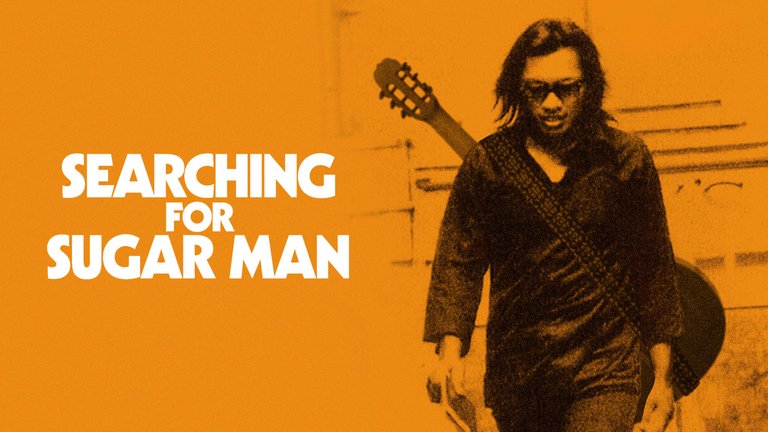
Una de las historias más increíbles que he conocido
Quite often I see a film that impresses me positively and I want to share it with others. Recommending a film, a director, an album, a song, is a common action in my daily life. However, I don't remember when was the last time a story generated this need to make it known to me. Yes, there will be spoilers, but not because I want to ruin your experience of this film but because I want everyone to know that reality can be more implausible than fiction and I want you to be drawn into one of the most incredible episodes in modern history.
Con bastante frecuencia veo alguna película que me impresiona positivamente y quiero compartirla con los demás. Recomendar un film, un director, un disco, una canción, es una acción común en mi vida diaria. Sin embargo, no recuerdo cuándo fue la última vez que una historia me generó esta necesidad de darla a conocer. Sí, habrá spoilers, pero no porque quiera arruinarles la experiencia de este film sino porque quiero que todo el mundo sepa que la realidad puede ser más inverosímil que la ficción y quiero que se sientan atraídos por uno de los episodios más increíbles de la historia moderna.
Detroit. The end of the 60's. The final era of The Beatles coincided with the glory of Bob Dylan, an American folk hero who had released his first albums and won the love of an entire country. In this socio-cultural context, a music producer named Mike Theodore contacts another producer, Dennis Coffey (who had worked or would work with stars such as Ringo Starr, Gladys Knight, Stevie Wonder and Marvin Gaye) and convinces him to go see a singer in a bar near the river. Upon entering the place, covered by a cloud of smoke from the cigarettes of the attendees, they discover the shadow of a man strumming his guitar, sitting with his back to the audience. His name: Sixto Rodriguez. The mix of the etherealness of the experience, the honesty in Rodriguez's voice, and the accuracy of his lyrics, led Theodore and Coffey to offer him to record an album that, in the opinion of both producers, was one of the best they had ever heard. In the opinion of one of them Rodriguez was a prophet, a unique figure in the folk-rock world of the time and a songwriter bigger than Bob Dylan himself. That first album, Cold Fact, was released in 1970 and although it was expected to be a smash hit on the radio and in the record stores, it turned out to be a resounding failure. Nobody bought the record. Nobody asked for it. To this day Theodore and Coffey wonder why? what went wrong? poor promotion? was it the name? the timing? They don't have answers to those questions, but it seems unfair that Sixto didn't become a star, that he wasn't given the recognition he deserved at the time.
Detroit. Finales de los años 60. La época final de The Beatles coincidió con la gloria de Bob Dylan, héroe del folk norteamericano que había lanzado sus primeros discos enamorando a todo un país. En ese contexto socio-cultural, un productor musical llamado Mike Theodore se pone en contacto con otro productor, Dennis Coffey (quien había trabajado o trabajaría con estrellas de la talla de Ringo Starr, Gladys Knight, Stevie Wonder y Marvin Gaye) y lo convence de ir a ver a un cantante en un bar cerca del río. Al ingresar al lugar, cubierto por una nube de humo de los cigarrillos de los asistentes, descubren la sombra de un hombre que rasgaba su guitarra, sentado de espaldas al público. Su nombre: Sixto Rodríguez. La mezcla de lo etéreo de la experiencia, la honestidad en la voz de Rodríguez y lo acertado de sus letras, hicieron que Theodore y Coffey le ofrecieran grabar un disco que, en opinión de ambos productores, era de lo mejor que habían escuchado. En la opinión de uno de ellos Rodríguez era un profeta, una figura única en el mundo folk-rock de la época y un compositor más grande que el mismísimo Bob Dylan. Ese primer disco, Cold Fact, vio la luz en 1970 y aunque se esperaba la rompiera en la radio y en las disco tiendas resultó ser un estrepitoso fracaso. Nadie compró el disco. Nadie lo pidió. Al día de hoy Theodore y Coffey se preguntan ¿por qué? ¿qué falló? ¿poca promoción? ¿fue el nombre? ¿el momento? No tienen respuesta para esas preguntas, pero les parece injusto que Sixto no se haya convertido en una estrella, que no se le haya dado el reconocimiento que merecía entonces.
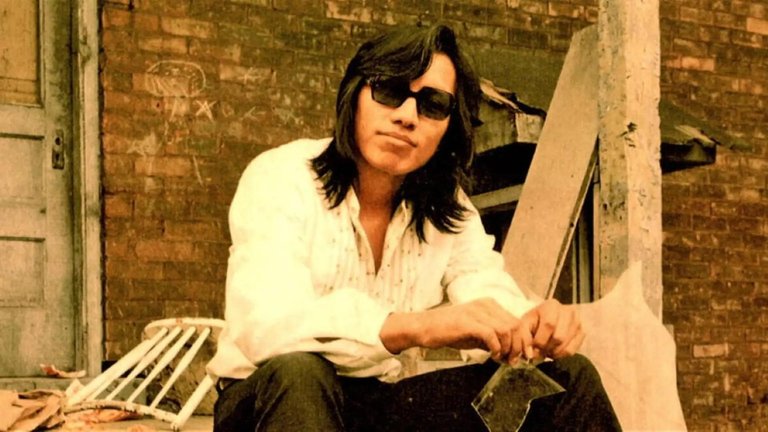
Months later, another music producer named Steve Rowland (who had worked or would work with The Cure, Peter Frampton, Gloria Gaynor, Jerry Lee Lewis and Boney M) heard Cold Fact and loved it. Also surprised by the commercial failure of the album, he proposed to Rodriguez to produce a second album which, according to Rowland, was as good as the first one. The work was called Coming from Reality and, like its predecessor, it passed ungloriously and sorrowfully through the world. It didn't sell, no one listened to it and the label fired Rodriguez who went back to work in construction and was lost among the pages of history.
Meses más tarde, otro productor musical llamado Steve Rowland (que había trabajado o trabajaría con The Cure, Peter Frampton, Gloria Gaynor, Jerry Lee Lewis y Boney M) escuchó Cold Fact y le encantó. Sorprendido también por el fracaso comercial del disco, le propuso a Rodríguez producir un segundo disco que, según Rowland, era tan bueno como el primero. El trabajo se llamó Coming from Reality y, al igual que su predecesor, pasó sin gloria y con mucha pena por el mundo. No se vendió, nadie lo escuchó y la discográfica despidió a Rodríguez quien volvió a trabajar en construcción y se perdió entre las páginas de la historia.
Now this is where the story gets really interesting. In the US Sixto Rodriguez was a nobody, but in South Africa he was a legend. Somehow a copy of Cold Fact made its way into the country and was passed from hand to hand, in some cases with bootleg copies, and it became a movement. In the early seventies South Africa was an ultra-conservative country, apartheid (segregation between blacks and whites, racial discrimination) was at its peak and the government controlled the media, radio, newspapers... due to international sanctions and the restrictive policies of its own government, the country lived isolated from the world. Foreign musicians couldn't perform there, nor could national musicians go abroad. South Africa was a bubble outside of which the world was changing, exploding, boiling with revolutions and protests, but inside of which any pronouncement against apartheid was cause for imprisonment. In that context the prophetic voice of Sixto Rodriguez was a call to the conscience of the citizens, the stories he had conceived in the proletarian and miserable Detroit echoed in Cape Town as if they had been composed for the Africans. The voice of the prophet had found his listeners and some of his songs became generational anthems for those who wanted to rebel against the establishment; moreover, Rodriguez's music had a great influence on a generation of musicians in that country who began to compose and sing songs as a measure of revolt. And all this happened in absolute mutual ignorance.
Ahora bien, aquí es donde la historia se pone realmente interesante. En EEUU Sixto Rodríguez no era nadie, pero en Sudáfrica era una leyenda. De alguna forma una copia de Cold Fact llegó al país y fue pasando de mano en mano, en algunos casos con copias piratas, y se fue convirtiendo en un movimiento. A principio de los años setenta Sudáfrica era un país ultra conservador, el apartheid (la segregación entre blancos y negros, la discriminación racial) estaba en su plenitud y el gobierno controlaba los medios de comunicación, la radio, los periódicos... debido a las sanciones internacionales y a las políticas restrictivas de su propio gobierno, el país vivía aislado del mundo. Los músicos extranjeros no podían presentarse allí ni los músicos nacionales podían ir al extranjero. Sudáfrica era una burbuja fuera de la cual el mundo cambiaba, explotaba, bullía de revoluciones y protestas, pero en cuyo interior cualquier pronunciamiento en contra del apartheid era causa de encarcelamiento. En ese contexto la voz profética de Sixto Rodríguez fue un llamado a la conciencia de los ciudadanos, las historias que había concebido en la proletaria y miserable Detroit hicieron eco en Cape Town como si hubieran sido compuestas para los africanos. La voz del profeta había encontrado a sus oyentes y algunas de sus canciones se convirtieron en himnos generacionales para quienes querían rebelarse contra el establishment; además, la música de Rodríguez tuvo una gran influencia en una generación de músicos de ese país que comenzaron a componer y a cantar canciones como medida de sublevación. Y todo esto ocurrió en la absoluta ignorancia mutua.

At the beginning, what Stephen 'Sugar' Segerman and Craig Bartholomew-Strydom were looking for was to explain the mystery of Rodriguez, to know who he had been before he died or killed himself on stage - shot, or immolated, there were different rumors about the singer's death -, they only had the cover of an album and the lyrics of his songs. When in South Africa they found out that nobody knew him in the USA, the mystery of Rodriguez only grew, because for them the singer must have been a star in his homeland. Incredible as it may seem, in the South Africa of the 70's Sixto Rodriguez was more famous than Elvis Presley, a whole generation idolized him and sang his songs that came to them as a gift from heaven at the moment they needed him the most.
Al inicio, lo que Stephen 'Sugar' Segerman y Craig Bartholomew-Strydom buscaban era explicarse el misterio de Rodríguez, saber quién había sido antes de morir o matarse en un escenario - de un disparo, o inmolado, corrieron diferentes rumores sobre la muerte del cantante -, sólo tenían la portada de un disco y las letras de sus canciones. Cuando en Sudáfrica se enteraron de que en EEUU nadie lo conocía, el misterio de Rodríguez no hizo sino crecer, porque para ellos el cantante debía ser una estrella en su tierra. Aunque parezca increíble, en la Sudáfrica de los años 70 Sixto Rodríguez era más famoso que Elvis Presley, toda una generación lo idolatró y cantó sus canciones que les llegaron como un regalo del cielo en el momento en el que más lo necesitaban.
That would be enough to make an emotional, interesting and unforgettable documentary, but believe me when I tell you that I didn't tell you even half of the story and that the biggest surprises are not - not by a long shot - in this post. The mystery of Rodriguez is even greater and Searching for Sugar Man is a documentary that surpasses any of the fiction I've seen in recent months, not only for what it tells but for what surrounds it. The film is a Swedish-British collaboration, with a Swedish director, about an American folk singer of Mexican descent who was ignored in his homeland and became - unwittingly - the unexpected hero of the social and political revolution in apartheid South Africa (?) You can't make that up. To make it even more bittersweet, two years after the documentary won a number of awards, including Oscar and BAFTA, director Malik Bendjelloul took his own life due to depression. He was 36 years old. Searching for Sugar Man was the only film he directed. Add to all this the fact that the documentary is also a chance to discover the music of Sixto Rodriguez, which I've been listening to since I heard this story, and I've been asking myself the same question that Mike Theodore, Dennis Coffey and Steve Rowland asked, how come it wasn't a hit, why didn't it get, at the time, the recognition it deserved? That part will remain a mystery, but the greatness of Sixto Rodriguez, his importance on the other side of the Atlantic Ocean and the transformative power of music are more than clearly portrayed in Searching for Sugar Man, one of the best documentary films you will ever see, do any of you know it or have seen it? I'll read you in the comments.
Con eso ya sería suficiente para hacer un documental emotivo, interesante e inolvidable, pero créanme cuando les digo que no les conté ni siquiera la mitad de la historia y que las mayores sorpresas no están - ni por asomo - en este post. El misterio de Rodríguez es todavía mayor y Searching for Sugar Man es un documental que supera cualquiera de las ficciones que haya visto en los últimos meses, no sólo por lo que cuenta sino por lo que lo rodea. La película es una colaboración sueco-británico, con un director sueco, sobre un cantante folk estadounidense de ascendencia mexicana que fue ignorado en su país y se convirtió - sin saberlo - en el inesperado héroe de la revolución social y política en la Sudáfrica del apartheid (?) Uno no se inventa algo así. Para darle un toque más agridulce aún, dos años después de que el documental obtuviese un cantidad importante de premios, incluidos el Oscar y el BAFTA, el director Malik Bendjelloul se quitó la vida debido a su depresión. Tenía 36 años. Searching for Sugar Man fue la única película que dirigió. A todo esto se suma el hecho de que el documental es también la posibilidad de descubrir la música de Sixto Rodríguez, que llevo escuchando desde que conocí esta historia, y me he estado haciendo la misma pregunta que se hicieran Mike Theodore, Dennis Coffey y Steve Rowland, ¿cómo es que no fue un éxito? ¿por qué no obtuvo, en su momento, el reconocimiento que merecía? Esa parte seguirá siendo un misterio, pero la grandeza de Sixto Rodríguez, su importancia al otro lado del océano atlántico y el poder transformador de la música están más que claramente retratadas en Searching for Sugar Man, una de las mejores películas documentales que van a poder ver en su vida, ¿alguno de ustedes la conoce o la ha visto? Los leo en los comentarios.
Reviewed by | Reseñado por @cristiancaicedo
Other posts that may interest you | Otros posts que pueden interesarte:
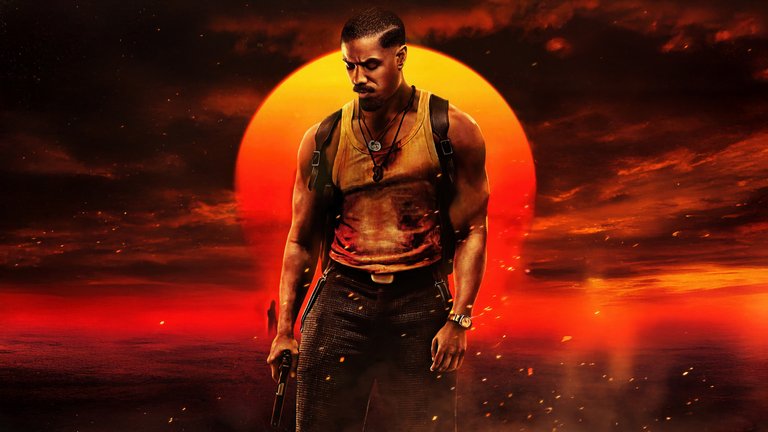 |
|---|
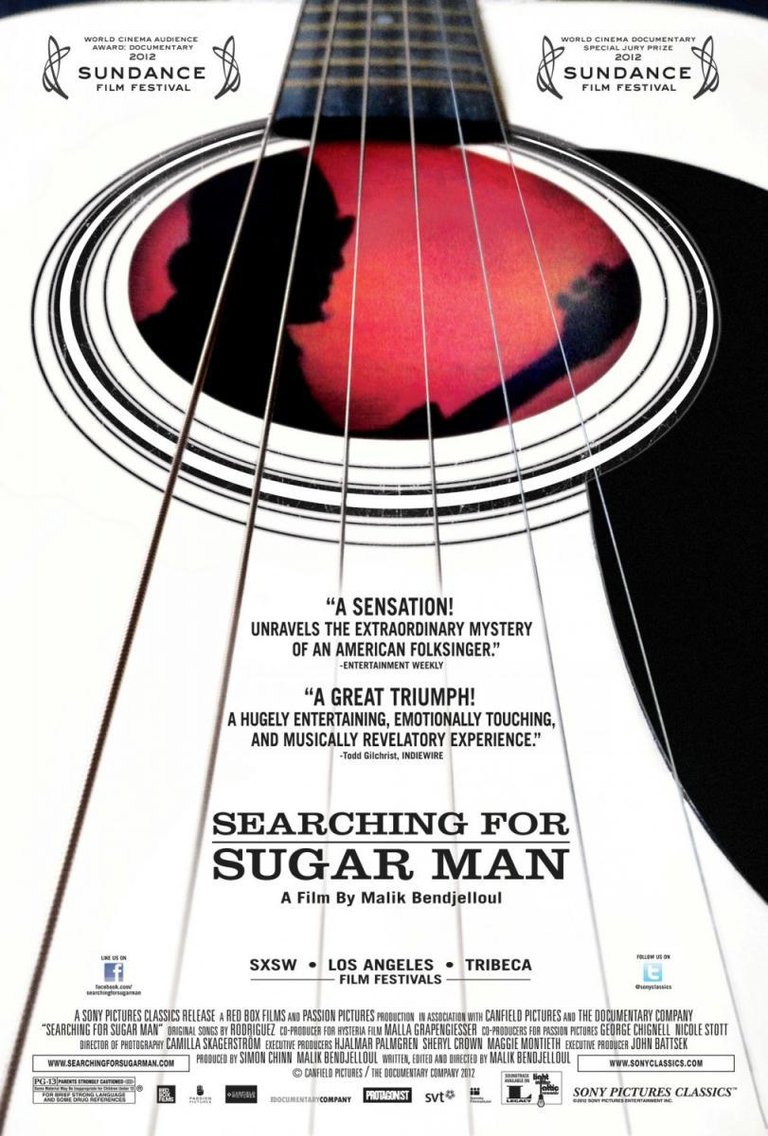
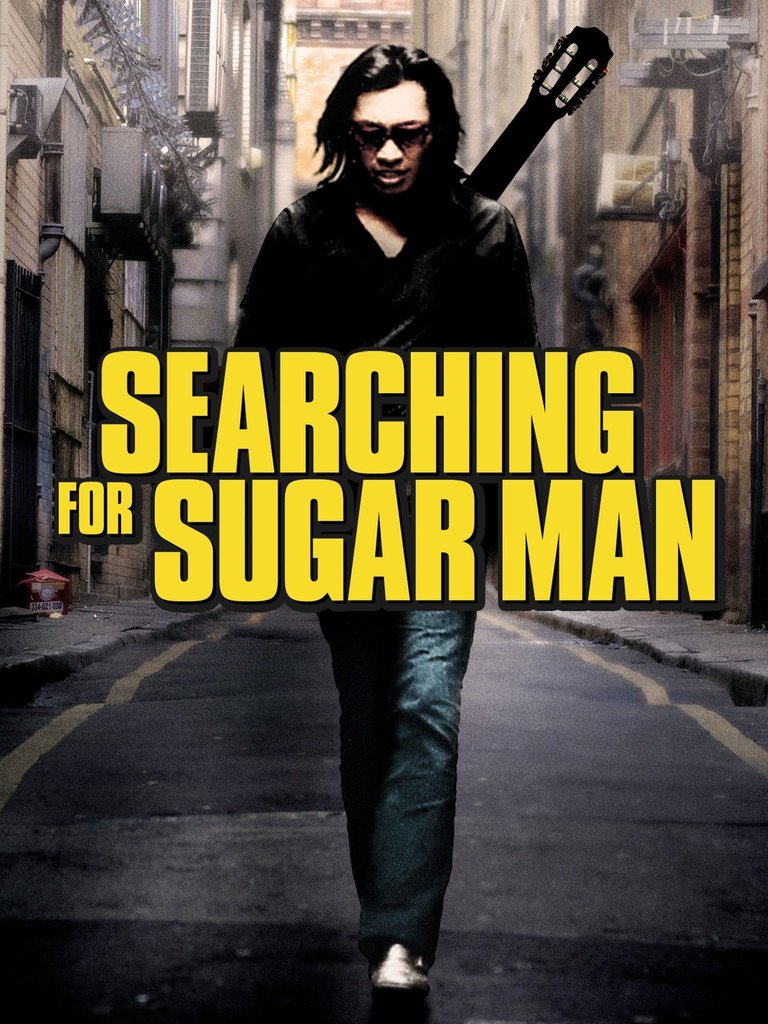
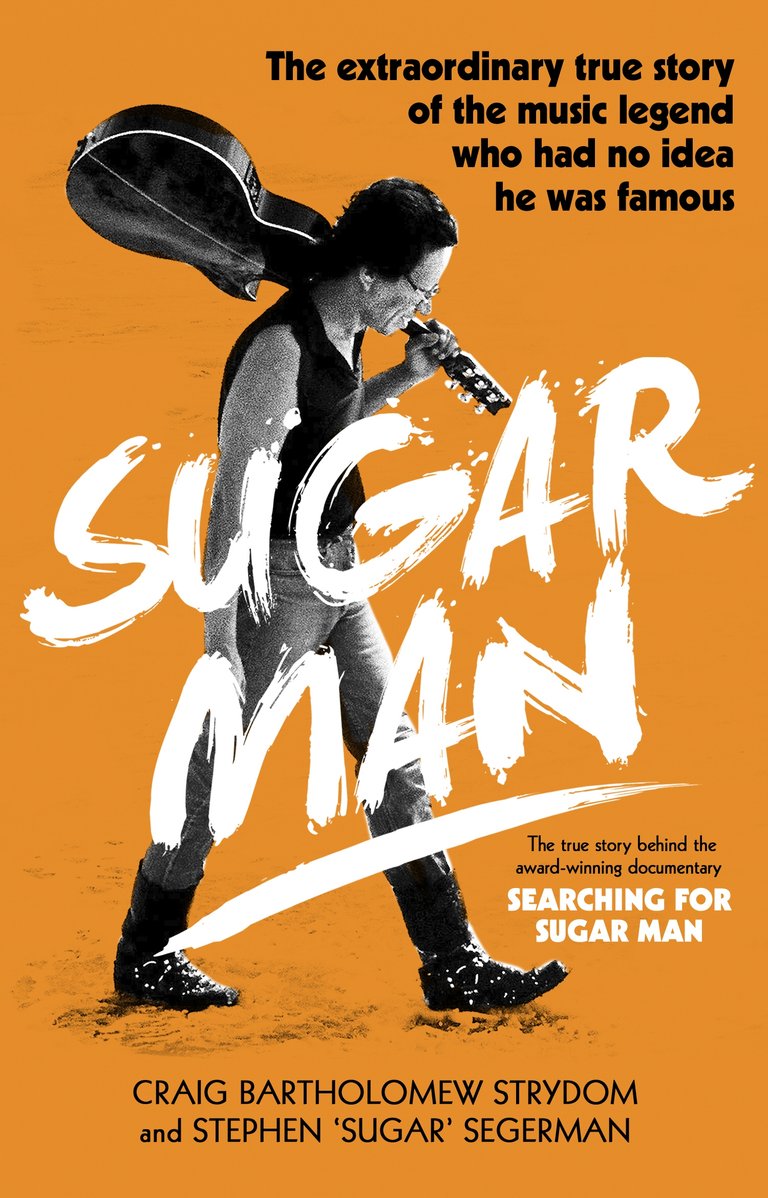


No tenía ni idea de este cantante ni del impacto que tuvo su música en ese lugar del mundo. Es interesante como cuentas la historia, definitivamente Sixto estaba destinado a ser una gran estrella pero tristemente no vivió para ver el fruto de su trabajo y pasión por la música. Gracias por compartir tu reseña ☺️
Congratulations @cristiancaicedo! You have completed the following achievement on the Hive blockchain And have been rewarded with New badge(s)
Your next target is to reach 12000 upvotes.
You can view your badges on your board and compare yourself to others in the Ranking
If you no longer want to receive notifications, reply to this comment with the word
STOPCheck out our last posts:
Well, no, I haven't seen the documentary, but you just blew my mind with the story! Is all of that really real? The fact that he was completely unknown in the US and a legend in South Africa without him even realizing it... sounds like a complete fiction script. You've really piqued my curiosity, really, really! Straight to my to-do list.